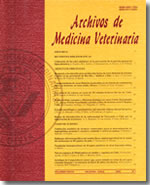Canine inflammatory bowel disease: endoscopic, biochemical and pathologic findings in anterior gastrointestinal tract
Main Article Content
Abstract
A retrospective study was carried out in 26 dogs referred to the Internal Medicine Service (Endoscopy Unit) of the Clinical Veterinary Hospital of Murcia University, diagnosed with inflammatory bowel disease affecting the anterior gastrointestinal tract. Haematological, endoscopic and pathologic findings were considered to assess potential correlation between these parameters. Neither hypoproteinemia nor hypoalbuminemia had a significant correlation with the degree of inflammation in the gastrointestinal mucosa. However, the animals with a lymphoplasmacytic infiltrate, presented a tendency to hypoalbuminemia. A statistically significant correlation (P < 0.05) was found between the type of infiltrate and the finding of congestion in gastroduodenal mucosa. An increased congestion was related to the lymphoplasmocytary infiltrate. There was also a correlation between the degree of congestion and the infiltrate intensity in the gastroduodenal mucosa, which approximated to the statistical significance, in spite of not being statistically significant (P < 0.1). In addition, friability is associated with inflammation in duodenum, and the animals who did not have a proper closure of the cardia presented esophagitis by reflux.

